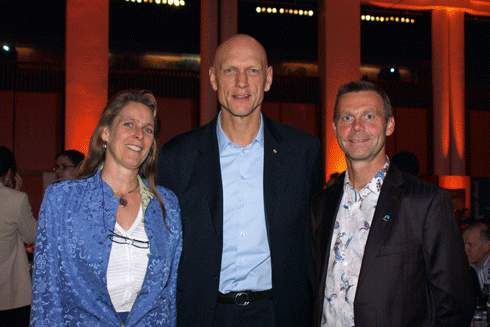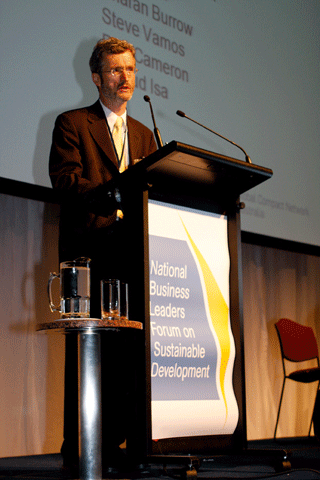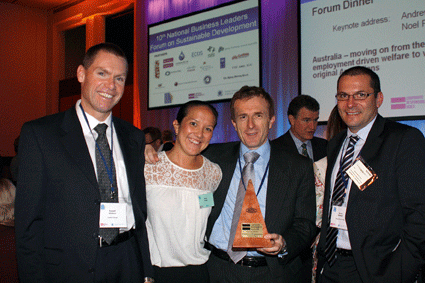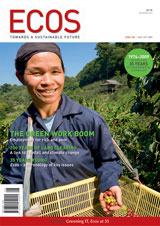
|
Published:
National business leaders see opportunities for change
With aftershocks of the international finance crisis still reverberating in late May, challenging industry and government leaders to re-double environmental and social development commitments was ambitious. But that was what this year’s 10th National Business Leaders Forum on Sustainable Development achieved.

|
|
From left: forum Convenor, Molly Harriss Olson, with Minister Peter Garrett and Fair Trade International CEO, Rob Cameron. Credit: Rachael Cunningham Photography
|
NGO representatives and environmental entrepreneurs turbo-charged presentations around the keynote theme: ‘Redesigning the global economy – turning risks and challenges crisis into opportunities’. Discussion reflected strengthening international debate about the window of opportunity the economic crisis offers to invest in ‘building back green’, locking in more sustainable infrastructure and practice across all sectors, and taking on climate change.
The forum opened by examining how the global financial crisis is affecting climate action, and how building a ‘green economy’ can drive a recovery by creating opportunities for organisational success, environmental traction and social development – all at once.
There was immediate focus on the need for stimulus responses to the economic slow-down to be targeted at maximising climate change mitigation and to achieve fast, substantial new infrastructure development and ‘environment jobs’.
Les Williamson, Managing Director of CISCO Australia and New Zealand, highlighted the central role of technology and innovation in facilitating industry take-up of new commitments. Shadow Minister for Climate Change, Environment and Water, Greg Hunt, outlined the imperative for government to lock in frameworks that better support sustainability innovation, and to deploy stimulus money tactically.
Where social development opportunity is concerned, both Reverend Tim Costello, CEO of World Vision Australia, and the Executive Chairman of CoolNRG, Nick Francis, emphasised that business commitment to socially aligned environmental change projects has the ‘double benefit’ of immediate impact in poorer regions while delivering positive returns ‘at home’. By working in collaboration with NGOs and government, the private sector can help break the poverty cycle and mitigate the negative effects of the global financial crisis. Such projects might also be addressing climate change and count towards Clean Development Mechanism (CDM) credits. It’s a commitment to green investment and skills that contributes to meeting the UN Millennium Development Goals.
The UN Global Compact is the world’s largest voluntary corporate citizenship initiative and forms a framework for social development investments. This year’s forum was particularly significant in that the Minister for Superannuation and Corporate Law, Senator Nick Sherry, and Georg Kell, Executive Director UN Global Compact (UNGC), launched the Australian Network of the Compact, to be hosted by the St James Ethics Centre.
Making the announcement, Senator Sherry said: ‘The Australian Network is already playing an active role in the recently formed Asia-Pacific Regional Network, which aims to increase the contribution of business to sustainable development in Asia and the Pacific, and Australia has been warmly welcomed by the existing Global Compact Networks.’
Major Australian firms, including Woolworths, Drake International, Westpac, BHP Billiton, Foster’s and Allen Arthur Robinson, are already signatories to the Compact.
Responding to the spirit of the event, Mr Kell said: ‘I travel all over the world attending meetings on sustainability and I have never been to a forum where a more senior group of business leaders were reflecting so deeply on the critical issues of our time.’
Last year, Treasury funded a project with the St James Ethics Centre aimed at enabling business of all sizes to embrace responsible practice within their supply chains, sector and locations, in alignment with key international initiatives including the UN Global Compact, the Global Reporting Initiative (GRI) and the annual Corporate Responsibility Index (CRI). The commencement of the project was announced after government, business and civil society collaborators spent the previous year developing the scheme’s framework.
Given the complexity of the current environment-business scenarios, and the need for speedy adaptation, it is more important than ever that scientists works closely with industry and government to provide the latest research for calibration.
Dr Megan Clarke, the new CEO of CSIRO, and David Vidal, Director of Research at the Conference Board (USA), described how science can help interpretations of the interplay between new policy and economic settings, for example where the Carbon Pollution Reduction Scheme-related legislation may affect businesses. Scientists at that presentation committed to working more closely with organisational leaders to improve communication and action.
Further focused workshops at the forum addressed hot topics. The potential for soil carbon increases and biochar applications to be multi-beneficial abatement solutions was discussed within the broader need for the agricultural sector to be included in emissions reductions mechanisms. Business and government proactivity needed to ‘green’ our cities for self-sufficiency and carbon reductions was separately explored, and a final session articulated priorities ahead of December’s COP15 climate negotiations in Copenhagen, and how to address them.

|
|
Georg Kell, Executive Director UN Global Compact, launched the Australian Network of the Compact. Credit: Rachael Cunningham Photography
|
Delegates and guests at the forum’s dinner were captivated by Andrew ‘Twiggy’ Forest, CEO of Fortesque Metals, and Indigenous leader Noel Pearson and their appeal for organisations across Australia to embrace their Australian Employment Covenant. Established late last year, the initiative aims to provide and guarantee 50 000 permanent new jobs for Indigenous Australians – plus support for driver’s licences and housing. Already, 13 600 new jobs have been committed.
On the final afternoon, in a different take on the ‘build it back green’ theme, panel sessions underlined the importance of business input to developing the resilience of communities to environmental disasters or weather events linked to climate change. A case study explored efforts to rebuild the township of Flowerdale more sustainably after the recent Victorian bushfires.
Addressing the forum and its objectives, Federal Minister for the Environment, Heritage and the Arts, Peter Garrett, said the government was committed to both supporting industry to maximise its contribution to sustainable development during the economic slow-down, and advancing its own initiatives. The Minister didn’t touch on the controversial Carbon Pollution Reduction Scheme structure – debated at the conference – in any detail, but he did highlight that major commitments under COAG to waste reduction and product stewardship, and a National Energy Efficiency Strategy, were among federal projects designed to move Australia forward toward a greener economy.
Convenor of the National Business Leaders Forum, Molly Harriss Olson, said the event was important because of the innovative ideas that it exposes and the consensus it builds around them. ‘This year the ideas were more powerful than ever, perhaps because the global financial crisis meant that we all have an urgent need to rethink the global economy and the role of business in designing a more sustainable future.’
‘Since 1997 we have been bringing leading thinkers in business innovation together to create a sustainable paradigm. For the first time there was a tangible awareness that we can do this! Indeed we have to do it! We can do business differently and the outcomes are not just sustainable but better for business, people and the planet too,’ she said.
‘Now we must coordinate our exchange of experience and information to assist with the transition, and focus on the area of independent verification and certification so we know the changes are substantial.
‘I believe that Australian business has the potential to really lead the world in getting the engagement right so that business is contributing meaningfully to sustainable development in all the communities in which we operate.’
More information:
National Business Leaders Forum on Sustainable Development, www.nblf.com.au




